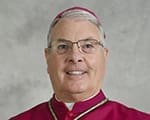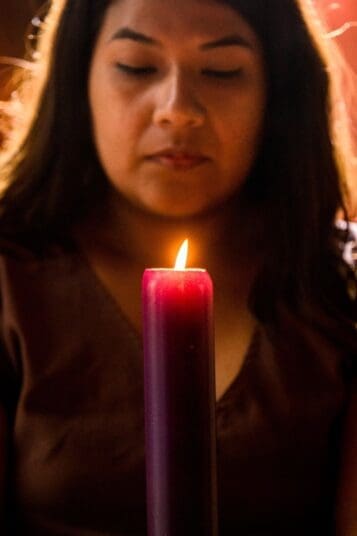 Archbishop Gregory J. Hartmayer, OFM Conv., is the seventh Archbishop of Atlanta. In his award-winning column “Peace and All Good,” he shares homilies and pastoral reflections.
Archbishop Gregory J. Hartmayer, OFM Conv., is the seventh Archbishop of Atlanta. In his award-winning column “Peace and All Good,” he shares homilies and pastoral reflections.Advent of the heart
By ARCHBISHOP GREGORY J. HARTMAYER, OFM Conv. | Published November 30, 2023 | En Español
“It’s beginning to look a lot like Christmas.”
As we wander through our neighborhoods, we see Christmas decorations making their appearance both inside and outside of homes. We see shopping malls filled with people searching for the perfect gift for the ones whom they love. We hear Christmas music all around. For those of us who like to shop online, our inboxes are full of advertising, coupons and special offers. While the world is busy promoting and pursuing its commercial interests, the church has entered into the holy season of Advent.

A young woman prays in front of a purple Advent candle. Advent is a season of waiting. CNS photo/Lisa Johnston, St. Louis Review
Advent comes from a Latin word meaning “a coming, approach, arrival.” Pope Francis reminds us: “Advent is a journey towards Bethlehem. May we be drawn by the light of God made man.”
Not only do we prepare for Christ’s coming at Christmas, but also for his return in glory at the end of time. It is a penitential season, throughout which violet vestments are worn signifying penance and sacrifice.
The Advent wreath, with its evergreen branches and candles, occupies a prominent place in our churches and homes. Over four weeks, the candles are lit on the respective Sundays of Advent. The first purple candle is called the prophecy candle and signifies hope. The second one, also purple, the Bethlehem candle, reminds us of Mary and Joseph’s journey from Nazareth to Jerusalem before the birth of Jesus.
The Third Sunday of Advent is called Gaudete Sunday, and a rose candle is lit—the Shepherd’s candle. Gaudete means joy. As Christmas approaches, our joy increases as we look forward to the coming of Jesus. This same joy was experienced by the shepherds as they traveled to Bethlehem to pay homage to Jesus in a manger. Finally, the fourth candle is called the angel’s candle and represents love. The child who was found in the manger will be the man crucified to a cross on the Hill of Calvary. It is the ultimate sacrifice of love—he will die for our sins.
It is regrettable that Advent is almost a non-event in the world in which we live. Because there are signs of Christmas all around us, it requires special effort and discipline on our part to enter into a spirit of prayer throughout the season. If we truly enter Advent in a spirit of prayer and sacrifice, we will most certainly reap many spiritual benefits. Also, the joyful anticipation of Christ’s coming will be intensified in our lives.
There is much we can do to make this season fruitful. Perhaps, we could commit to coming to Mass on an additional day to Sunday. Or we could take more time to read the Scriptures each day, as well as devotional materials. Advent is a beautiful time to experience God’s mercy in the sacrament of confession. Mindful of the poor and suffering, we could volunteer in a soup kitchen or visit the sick. Organizations such as the St. Vincent de Paul Society and the Knights of Columbus, as well as many parishes and schools organize various initiatives providing food and gifts to those in need.
The golden threads
Father Alfred Delp was a German Jesuit priest whose impassioned homilies drew the Nazi Gestapo to his parish in Berlin. A member of the German resistance, he was under Nazi scrutiny. He was imprisoned in 1944 and executed by hanging on Feb, 2, 1945. The last Advent of his life was spent in a prison cell, from where he wrote several meditations. These were smuggled out of the prison to his parishioners.
He wrote, urgently, of Advent being a season meant to shake us to the core: “The shaking, the awakening: with these, life merely begins to become capable of Advent. It is precisely in the severity of this awakening, in the helplessness of coming to consciousness, in the wretchedness of experiencing our limitations that the golden threads running between heaven and earth during this season reach us; the threads that give the world a hint of the abundance to which it is called, the abundance to which it is capable.”
Father Delp knew that what is good at the heart of the Christmas feast lay beyond even the gifts of being with family, throwing open the doors of our homes in hospitality, or celebrating family traditions.
“The golden threads running between heaven and earth”—the reality of God becoming man—is what is truly important. Delp endlessly calls his people back to the primary themes of Advent—watching and waiting. In his words: “Many of the things that are happening today would never have happened if we had been living in that longing, that disquiet of heart which comes when we are faced with God, and when we look clearly at things as they really are. Here is the message of Advent: faced with him who is the Last, the world will begin to shake.”
I highly recommend Father Delp’s book as spiritual reading during Advent. It is called “Advent of the Heart: Seasonal Sermons and Prison Writings—1941-1944″ (Ignatius Press, 2006).
May God bless you on your Advent journeys, and may he always grant you his peace.